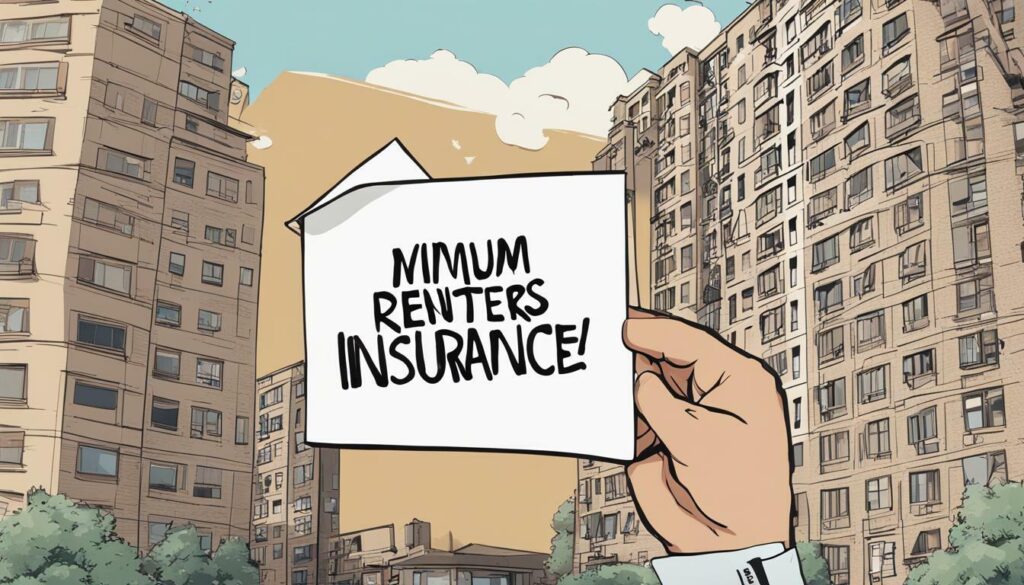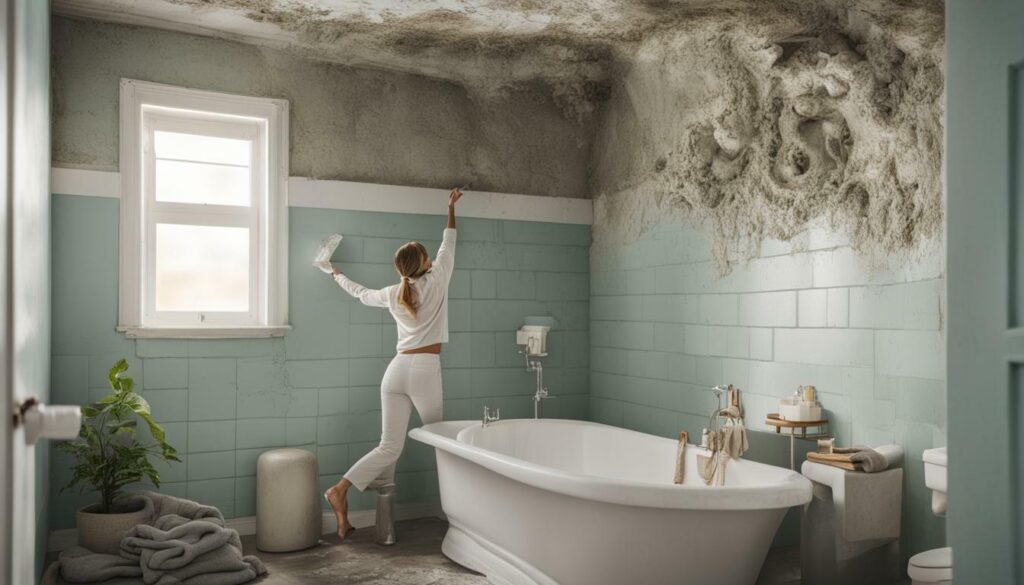If you are renting an apartment, you may be wondering how much renters insurance you need. Most apartments have specific requirements when it comes to renters insurance, so it’s important to understand these requirements to ensure your personal belongings are adequately protected.
Typically, renters insurance requirements for apartments include liability coverage and coverage for personal property. The amount required may vary depending on the apartment complex, but it’s generally recommended to have at least $100,000 in liability coverage and $20,000 in personal property coverage.
Keep in mind that while renters insurance may not be legally required in most states, it is highly recommended to protect your personal belongings and liability. Without renters insurance, any damage or loss to your personal property may not be covered, leaving you with significant financial loss.
Key Takeaways:
- Most apartments require renters insurance that includes liability coverage and coverage for personal property.
- The recommended amount of liability coverage is $100,000, and personal property coverage is $20,000.
- Renters insurance is not legally required, but it’s highly recommended to protect your personal belongings and liability.
Renters Insurance Guidelines
When it comes to renting an apartment, it’s important to understand the renters insurance guidelines set by your apartment complex. These guidelines are designed to protect both you and the property, and failing to comply with them can result in serious consequences.
Most apartment complexes require tenants to have renters insurance with a minimum amount of coverage. This coverage typically includes liability insurance and personal property coverage. Liability insurance protects you in case someone is injured while in your apartment, while personal property coverage protects your belongings in case of theft, fire, or other covered events.
In addition to the required coverage, some apartment complexes may also have specific insurance requirements regarding the insurance company you use or the deductible amount you choose. It’s important to carefully review your lease agreement to ensure that you meet all of the necessary guidelines.


Keep in mind that while the required amount of coverage may be enough to meet your apartment complex’s guidelines, it may not be sufficient to fully protect you in case of a loss. You may want to consider purchasing additional coverage to ensure that you are adequately protected.
Overall, understanding renters insurance guidelines is essential for any tenant. By complying with these guidelines and obtaining the necessary coverage, you can protect yourself, your belongings, and your liability in case of unforeseen events.
Minimum Renters Insurance for Apartments
When it comes to renting an apartment, it’s important to understand the minimum renters insurance requirements set by most landlords. While the specific requirements may vary between complexes and states, having a basic understanding of the coverage needed can help you ensure that you have adequate protection for your personal belongings and liability.
In most cases, apartment complexes will require tenants to have a certain amount of personal property coverage. This coverage protects your personal belongings, such as furniture, electronics, and clothing, in the event of theft, fire, or other covered events. While the minimum coverage amount may vary, it typically ranges from $10,000 to $30,000.
In addition to personal property coverage, your apartment complex may also require liability coverage. Liability coverage protects you in the event that someone is injured on your property or you cause damage to someone else’s property. The minimum liability coverage required by apartments is typically $100,000.
It’s important to note that while these are the minimum coverage requirements set by most apartment complexes, it may not be sufficient for your individual needs. Factors such as the value of your personal belongings and the level of risk you are exposed to may require additional coverage.
When shopping for renters insurance policies, be sure to compare the coverage and costs of different policies to ensure you are getting the best value for your needs. By understanding the minimum renters insurance requirements for apartments and evaluating your own coverage needs, you can ensure that you have the protection you need in the event of an unexpected event.


Average Renters Insurance Coverage
When it comes to renters insurance coverage, it’s important to understand what the average policy offers. The average renters insurance policy typically provides coverage for personal property, liability, and additional living expenses.
Personal property coverage typically covers your belongings in the event of theft, fire, or other covered perils. The average coverage limit for personal property is around $30,000, but this can vary depending on your specific needs and the level of coverage you select.
Liability coverage can provide protection in the event that you are held responsible for damage or injury to a person or their property. The average liability coverage limit is around $100,000, but you may want to consider higher limits depending on your assets and potential risks.
Additional living expenses coverage can provide financial assistance if you are unable to live in your rental due to a covered loss. This coverage typically includes expenses for temporary shelter, food, and other necessities. The average coverage limit for additional living expenses is around 20% of your personal property coverage limit.


Understanding the average renters insurance coverage can help you determine the level of protection you need for your personal belongings and liability. You may want to consider additional coverage options depending on your specific circumstances and risks.
Recommended Renters Insurance for Apartments
When it comes to protecting your personal belongings and liability in an apartment, it’s important to have the right amount of renters insurance coverage. Most apartments require tenants to have a minimum amount of coverage, but it’s recommended that you obtain more than the minimum to ensure adequate protection.
So, how much renters insurance should you have for your apartment? The answer depends on the value of your personal belongings and your liability risks. It’s recommended that you have at least $20,000 to $30,000 of personal property coverage and $100,000 of liability coverage.
Keep in mind that these are just general recommendations, and your specific needs may vary. For example, if you have expensive jewelry or electronics, you may need to increase your personal property coverage. If you have a high-risk job or frequently have visitors, you may want to consider increasing your liability coverage.
Ultimately, the goal of renters insurance is to protect you from financial loss in the event of an unexpected event. By obtaining the recommended amount of coverage, you can have peace of mind knowing that you’re adequately protected.


Don’t make the mistake of underestimating the value of renters insurance. By obtaining the right amount of coverage, you can protect yourself from the unexpected and avoid costly losses. When shopping for renters insurance, be sure to compare quotes and evaluate the reputation of insurance providers to find the right policy for you.
Understanding the Costs of Renters Insurance
When it comes to renters insurance, one of the most important factors to consider is the cost. Knowing what affects the costs of renters insurance can help you budget for your premium and make informed decisions about your coverage options.
Here are some of the main factors that can impact the cost of your renters insurance:
- Deductible: The higher your deductible, the lower your premium will be. However, make sure you can afford to pay the deductible amount in the event of a claim.
- Coverage amount: The more coverage you need, the higher your premium will be.
- Location: Where you live can impact your premium, as some areas may have higher rates of theft or natural disasters.
- Insurance company: Different insurance companies may offer different rates for the same coverage, so it’s important to compare quotes.
It’s also important to note that additional coverage options, such as adding coverage for expensive jewelry or electronics, can increase your premium. However, it may be worth considering if you have valuable items that you want to ensure are fully protected.


Ultimately, the cost of renters insurance will depend on your specific situation and the coverage options you choose. To get an accurate quote, it’s best to reach out to insurance providers and provide them with the information they need to give you a personalized estimate.
Benefits of Renters Insurance
As a renter, you may think that you don’t need insurance because you don’t own the property. However, that is not entirely true. Renters insurance offers significant benefits that can protect you financially in the event of unforeseen circumstances. Here are some benefits of having renters insurance:
- Protection for personal belongings: Renters insurance provides coverage for personal belongings such as furniture, clothing, and electronics. If your personal property is damaged or stolen, your insurance can help you replace them.
- Liability coverage: If someone is injured while visiting your home, renters insurance can help pay for their medical expenses. Additionally, if you accidentally damage someone else’s property, your renters insurance can help cover the costs of repairs or replacement.
- Temporary housing: If your apartment becomes uninhabitable due to events covered by your insurance, such as fire or flood, your renters insurance can provide coverage for temporary housing expenses.
- Possessions outside of your home: Renters insurance can provide coverage for your personal belongings even if they are outside of your apartment. For example, if your laptop is stolen while you’re at a coffee shop, your renters insurance can help cover the cost of replacement.
- Peace of mind: With renters insurance, you can have peace of mind knowing that you are protected financially in the event of unexpected situations.
While renters insurance is not mandatory, it is highly recommended for all renters. By investing in renters insurance, you can protect yourself from financial loss and have peace of mind knowing that you are covered. So, don’t wait until it’s too late, get renters insurance today!


Coverage You Need in the US
When looking for renters insurance in the United States, there are a few coverage options you should consider to ensure you have adequate protection for your personal belongings and liability.
Personal Property Coverage
Personal property coverage is the most basic coverage offered by renters insurance policies. This provides protection for your personal belongings in case of theft, damage, or loss due to covered events such as fire or water damage. Make sure to take an inventory of all your belongings and their value to determine the appropriate coverage amount.
Liability Coverage
Liability coverage is important to protect you from potential lawsuits resulting from injuries or damages that occur on your rental property. This coverage can also extend to incidents outside of your property, such as if your dog bites someone at a park.
Additional Living Expenses Coverage
If your rental property becomes uninhabitable due to a covered event, additional living expenses coverage can help cover the cost of temporary accommodations, meals, and other expenses.
Flood and Earthquake Coverage
Standard renters insurance policies do not typically cover damage from floods or earthquakes. If you live in an area prone to these natural disasters, it’s important to consider adding this coverage to your policy.
By understanding the coverage options available, you can tailor your policy to your specific needs and ensure you have the right level of protection for your rental property.


Finding the Right Renters Insurance Policy
When searching for the right renters insurance policy, it’s important to consider a few key factors to make an informed decision. By following these steps, you can find a policy that meets your specific needs:
- Compare Quotes: Get quotes from multiple insurance providers to compare coverage and pricing. This will help you find the best policy at a rate that fits your budget.
- Evaluate the Reputation of Insurance Providers: Research the reputation of insurance providers by checking online reviews and ratings from previous customers. This will give you an idea of their level of customer service and claims processing efficiency.
- Consider Coverage Options: Review the different types of coverage available, including personal property, liability, and loss of use. Make sure the policy you choose provides adequate coverage for your needs.
- Assess Your Risk: Evaluate the potential risks associated with your location and lifestyle to determine the coverage you need. For example, if you live in an area prone to natural disasters, you may want to consider additional coverage for flood or earthquake damage.
- Ask Questions: Don’t be afraid to ask questions about your policy, such as what is and isn’t covered, how claims are processed, and what your deductible is. Understanding the details of your policy can help you make the best decisions to protect your belongings.
By keeping these factors in mind, you can find the right renters insurance policy to meet your needs and give you peace of mind.


Conclusion
When searching for an apartment, understanding the insurance requirements set by the complex is important to ensure you have adequate coverage for your belongings and liability. Most apartments require a minimum amount of renters insurance, which can vary depending on the location and size of the unit.
It’s important to note that the minimum coverage required by the apartment complex may not necessarily be enough to fully protect you. Consider getting additional coverage to safeguard against unexpected events that could cause damage or loss to your personal property.
When shopping for renters insurance, be sure to compare quotes from multiple providers and explore different coverage options. Look for an insurance provider that has a good reputation and offers a policy that fits your specific needs and budget.
By taking the time to understand the apartment insurance requirements and obtaining the right amount of coverage, you can have peace of mind knowing your personal belongings and liability are protected.
FAQ
Q: How much renters insurance do most apartments require?
A: Most apartments typically require tenants to carry a minimum amount of renters insurance coverage. The exact amount may vary, so it’s important to check with your specific apartment complex for their requirements.
Q: What are the renters insurance guidelines for apartment complexes?
A: Apartment complexes usually have specific guidelines for renters insurance that tenants must follow. These guidelines may include minimum coverage limits, required liability protection, and naming the complex as an additional insured party.
Q: What is the minimum amount of renters insurance required for apartments?
A: The minimum amount of renters insurance required for apartments can vary. It is advisable to have enough coverage to protect your personal belongings and liability. Check with your apartment complex to determine their specific requirements.
Q: What is the average renters insurance coverage?
A: The average renters insurance coverage typically includes personal property protection, liability coverage, and additional living expenses. The coverage limits and types can vary, so it’s important to review different insurance policies to find the right one for you.
Q: How much renters insurance is recommended for apartments?
A: It is recommended to have sufficient renters insurance coverage for apartments to protect your personal belongings and liability. The recommended amount may vary, so consider factors like the value of your belongings and potential liability risks when determining your coverage needs.
Q: What factors affect the costs of renters insurance?
A: Several factors can affect the costs of renters insurance, including the location of your apartment, the amount of coverage you choose, your deductible, and any additional coverage options you select. It’s important to review quotes from different insurers to find a policy that fits your budget and coverage needs.
Q: What are the benefits of renters insurance?
A: Renters insurance offers several benefits, including protection for your personal belongings in case of theft, fire, or other covered events. It also provides liability coverage in case someone is injured in your apartment and can help cover additional living expenses if your apartment becomes uninhabitable. It’s a valuable investment to protect your assets and provide peace of mind.
Q: What coverage options should I consider for renters insurance in the US?
A: When getting renters insurance in the US, it’s important to consider coverage options such as personal property protection, liability coverage, additional living expenses, and medical payments. Evaluating your specific needs and potential risks will help you determine the coverage options that best suit you.
Q: How do I find the right renters insurance policy?
A: Finding the right renters insurance policy involves comparing quotes from different insurance providers, evaluating their reputation and customer reviews, and considering the coverage options and discounts they offer. It’s important to review and understand the policy terms and conditions before making a decision.







